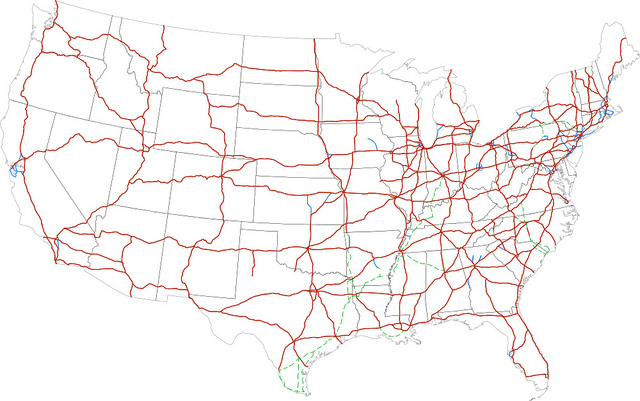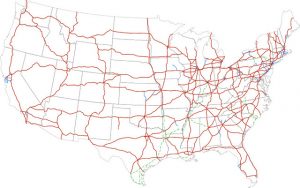
A recent national public opinion survey allowed Americans to weigh in on how the nation should pay for its crumbling infrastructure, and the results are somewhat surprising. The survey, Transportation Mobility 2016, conducted by HNTB Corp. and released today, shows that 65 percent of those surveyed would support user fees such as levies on vehicle miles traveled or mileage-based fees to address the country’s deteriorating transportation infrastructure.
That figure is up considerably over a similar survey conducted in 2014, when only 50 percent of those surveyed said they would lend their support to some kind of user fee for upkeep of the nation’s roads and bridges.

Image of U.S. interstate system map by Michael Hicks licensed under CC BY 2.0.
The survey also revealed that an additional 60 percent of respondents would support priced managed lanes to help fund infrastructure improvements.
Most states struggle with funding for a growing backlog of transportation infrastructure maintenance needs as well as a need for new construction to mitigate traffic congestion that increases exponentially with a burgeoning population growth. As a result, government officials are exploring new financing possibilities for bridging budget gaps. Funding for transportation infrastructure has taken a hit in recent years due to decreased gas tax revenues at the state and federal levels. These tax revenues have dwindled as a result of the advent of more fuel-efficient vehicles and the fact that gas taxes in most states and at the federal level have not been increased in years.
However, it appears now that Americans are realizing that alternative funding sources may be a necessary part of the equation for financing transportation projects. And, according to the HNTB survey, the public is becoming more open to certain fees and taxes being part of the funding solution.
In spite of increasing support for user fees, segments of the nation’s population remain firm backers of tax revenues to help pay for infrastructure needs. Fifty-five percent of those surveyed indicated that the next 10 years of construction and maintenance of the nation’s local roads, bridges and tunnels should be funded by taxes – gas taxes, sales taxes and property taxes – rather than user fees. Asked how maintenance, additional lanes and safety improvements for Interstate highways should be funded, 56 percent of respondents support increased taxes over user fees, the majority favoring an increase in the federal gas tax rather than sales and property tax increases.
As state and local governments struggle to meet their transportation infrastructure needs and as traffic congestion increases and maintenance backlogs grow, government officials will continue to face some difficult decisions regarding transportation funding. Public-private partnerships (P3/PPPs) already are increasing as one means of ensuring that transportation needs are met, bringing private capital into the funding mix. Decision-makers must fund the right combination of revenue – whether an infusion of private capital, an increase in taxes and levies or addition of other innovative financing solutions – to ensure an efficient and safe national transportation network.
